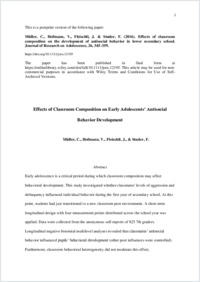Effects of Classroom Composition on the Development of Antisocial Behavior in Lower Secondary School
- Müller, Christoph Michael University of Fribourg
- Hofmann, Verena University of Fribourg
- Fleischli, Janine University of Fribourg
- Studer, Felix University of Fribourg
-
2015
Published in:
- Journal of Research on Adolescence. - 2015, vol. 26, p. 345-359
Peer influence
classroom composition
behavioral problems
antisocial behavior
aggression
delinquency
secondary school
English
Early adolescence is a critical period during which classroom composition may affect behavioral development. This study investigated whether classmates' levels of aggression and delinquency influenced individual behavior during the first year of secondary school. At this point, students had just transitioned to a new classroom peer environment. A short-term longitudinal design with four measurement points distributed across the school year was applied. Data were collected from the anonymous self-reports of 825 7th graders. Longitudinal negative binomial multilevel analyses revealed that classmates’ antisocial behavior influenced pupils’ behavioral development (other peer influences were controlled). Furthermore, classroom behavioral heterogeneity did not moderate this effect.
- Faculty
- Faculté des lettres et des sciences humaines
- Department
- Département de Pédagogie spécialisée
- Language
-
- English
- Classification
- Special education
- License
-
License undefined
- Identifiers
-
- RERO DOC 326772
- DOI 10.1111/jora.12195
- Persistent URL
- https://folia.unifr.ch/unifr/documents/307884
Statistics
Document views: 183
File downloads:
- Fichier principal: 368
